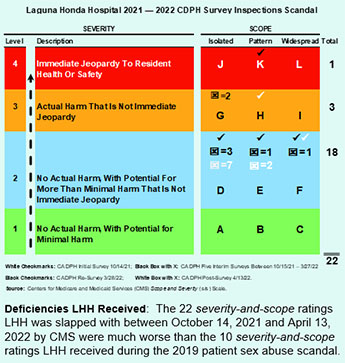 August 1, 2022
August 1, 2022One Informal Dispute Resolution Request, Three Appeals
City’s Pathetic Defense of Laguna Honda Hospital
 August 1, 2022
August 1, 2022
One Informal Dispute Resolution Request, Three Appeals
City’s Pathetic Defense of Laguna Honda Hospital
August 4 Update: Nine LHH Patients Have Died
Following Discharge or Transfer From Laguna Honda Hospital;
City Attorney and Louise Renne Filed Formal Lawsuits on August 3
(The lawsuits are available here. See Potscript at end of this article.)
July 28, 2022 Late-Breaking News:
Two Board of Supervisors Resolutions Passed July 26 —
One to U.S. DHHS Secretary Xavier Becerra and
One to Governor Gavin Newsom and Tomás Aragón —
Finally Helped Pause LHH Residents’ Discharges
by Patrick Monette-Shaw
News surfaced late Thursday afternoon July 28 announcing a temporary pause of any further discharges of LHH residents, at least for the time being, until LHH regains Centers for Medicare and Medicaid Services (CMS) re-certification.
But it wasn’t the efforts of City officials like LHH CEO Roland Pickens, Director of Public Health Grant Colfax, City Attorney David Chiu, or even Mayor London Breed who accomplished this great victory.
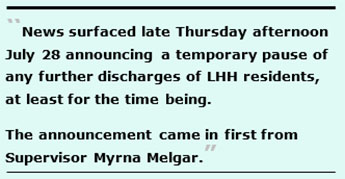 The victory was due in large part by community activists trying to prevent further transfer trauma-induced patient deaths working closely with the Board of Supervisors — particularly District 7 Supervisor Myrna Melgar who rallied the Board of Supervisors into passing two urgent Resolutions on July 26 she had introduced — before the Board went out on summer recess for the month of August. It was Melgar who achieved this potentially temporary victory!
The victory was due in large part by community activists trying to prevent further transfer trauma-induced patient deaths working closely with the Board of Supervisors — particularly District 7 Supervisor Myrna Melgar who rallied the Board of Supervisors into passing two urgent Resolutions on July 26 she had introduced — before the Board went out on summer recess for the month of August. It was Melgar who achieved this potentially temporary victory!
The announcements received on Thursday, July 28 that LHH resident discharges and transfers have been temporarily paused came in first from Supervisor Myrna Melgar, then from a Mayor Breed press release, and finally from Roland Pickens, who had the audacity to suggest:
“Laguna Honda worked with, and at the direction of, CMS, the California Department of Public Health (CDPH) and the California Department of Health Care Services (DHCS) to pause the discharge and transfer of all [LHH] residents.”
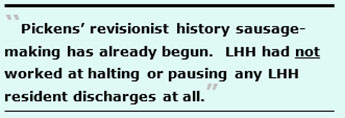 Pickens’ revisionist history sausage-making has already begun. LHH had not worked at halting or pausing any of the LHH resident discharges at all, and had done no such thing. For their parts, Breed, Chiu, and Colfax had also done nothing to seek Federal injunctive relief to halt or pause discharges and transfers of LHH residents before the Board of Supervisors passed the two resolutions on July 26, below. They’re grandstanding off of Melgar’s tenacity.
Pickens’ revisionist history sausage-making has already begun. LHH had not worked at halting or pausing any of the LHH resident discharges at all, and had done no such thing. For their parts, Breed, Chiu, and Colfax had also done nothing to seek Federal injunctive relief to halt or pause discharges and transfers of LHH residents before the Board of Supervisors passed the two resolutions on July 26, below. They’re grandstanding off of Melgar’s tenacity.
Two Resolutions Board of Supervisors Passed on July 26
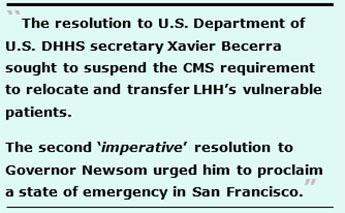 The resolution to U.S. Department of Health and Human Services (DHHS) secretary Xavier Becerra sought to suspend the CMS requirement to relocate and transfer LHH’s vulnerable patients leading up to LHH gaining CMS recertification; and to extend coverage of Medicare and Medicaid payments until CMS makes its determination regarding LHH’s recertification, potentially in late December.
The resolution to U.S. Department of Health and Human Services (DHHS) secretary Xavier Becerra sought to suspend the CMS requirement to relocate and transfer LHH’s vulnerable patients leading up to LHH gaining CMS recertification; and to extend coverage of Medicare and Medicaid payments until CMS makes its determination regarding LHH’s recertification, potentially in late December.
The second “imperative” resolution sponsored and introduced as an emergency “Imperative Agenda” item by Supervisor Melgar and initially co-sponsored only by Supervisors Mandelman and Peskin to Governor Newsom and California Department of Public Health ( CDPH) director Tomás Aragón urged the Governor to proclaim a state of emergency in San Francisco County relating to the imminent risk of displacing LHH’s elderly and medically infirm patients. The “imperative” resolution also urged director Aragón to withdraw CDPH’s approval of the LHH Closure and Patient Relocation and Transfer Plan that had required transfer of all patients within a four-month period.
 By the time the two resolutions were introduced four LHH patients had already died shortly after their discharges from LHH, thought to have been caused, in part, by transfer trauma, a known medical risk to the elderly and disabled. Both Resolutions passed on July 26 with a unanimous vote of 11 to zero.
By the time the two resolutions were introduced four LHH patients had already died shortly after their discharges from LHH, thought to have been caused, in part, by transfer trauma, a known medical risk to the elderly and disabled. Both Resolutions passed on July 26 with a unanimous vote of 11 to zero.
Westside Observer Recent Reporting
My Westside Observer colleague Dr. Kerr kindly called LHH’s anemic efforts to halt the discharges a “muffled defense” on July 19. Given late-breaking public records just released on July 22 after Kerr’s article was published, I believe LHH’s appeals, and legal actions should more appropriately be called a “pathetic defense.”
News broke on April 14, 2022 CMS had terminated Laguna Honda Hospital’s (LHH) CMS Provider Participation Agreement, halted new admissions to LHH, cut off federal funding for LHH’s current patients effective September 15, and ordered LHH to discharge all of its then 681 patients by September 13.
The Westside Observer website has carried the excellent investigate reporting by Dr. Derek Kerr since news of the LHH scandal began, including in April 2022, May, June, July 5, and a second article on July 19, titled “City’s Muffled Defense of Laguna Honda.” [I have also published Westside Observer articles about LHH on July 5 and a second one on July 19.]
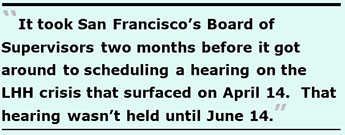 Two Board of Supervisors Hearings
Two Board of Supervisors Hearings
It took San Francisco’s Board of Supervisors two months before it got around to scheduling a Board of Supervisors Committee of the Whole (CoW) hearing on the LHH crisis that surfaced on April 14. That hearing wasn’t held until June 14 — as if there was no great urgency for the Board of Supervisors to become involved in saving LHH’s residents and the hospital itself.
LHH’s then CEO, Michael Phillips was quickly and unceremoniously deposed, and his employment ended on June 2. He was replaced by an acting CEO, a 30-year employee of the Department of Public Health (SFDPH), Roland Pickens, who up until then was Director of SFDPH’s Community Health Network consisting of 14 community health centers and clinics.
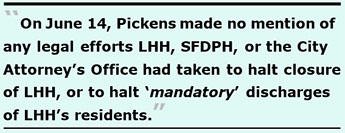 During the June 14 CoW hearing, Pickens delivered a PowerPoint slideshow to the Board of Supervisors addressing what actions LHH was taking, including steps LHH was taking to comply with CMS’ instructions and orders to discharge LHH’s patients and begin efforts to regain CMS certification. Pickens made no mention of any legal efforts LHH, SFDPH, or the City Attorney’s Office had taken, or were taking, to halt the closure of the hospital and stop the “mandatory” discharges of LHH residents to out-of-county facilities.
During the June 14 CoW hearing, Pickens delivered a PowerPoint slideshow to the Board of Supervisors addressing what actions LHH was taking, including steps LHH was taking to comply with CMS’ instructions and orders to discharge LHH’s patients and begin efforts to regain CMS certification. Pickens made no mention of any legal efforts LHH, SFDPH, or the City Attorney’s Office had taken, or were taking, to halt the closure of the hospital and stop the “mandatory” discharges of LHH residents to out-of-county facilities.
Unfortunately, the Board of Supervisors didn’t query Pickens during the June 14 CoW hearing, and none of the 11 Supervisors asked Pickens what legal remedies SFDPH or LHH had taken or were pursuing to push back on CMS’ termination of LHH’s Provider Participation Agreement.
Following the June 14 CoW hearing, to her credit Supervisor Melgar took it upon herself to individually write to DHHS Secretary Xavier Becerra on June 16 in her capacity as District 7 Supervisor soliciting his help protecting LHH’s residents.
Also following the June 14 CoW hearing, I submitted public testimony to the Board of Supervisors Government Audits and Oversight (GAO) Committee on June 29 asking it to rapidly schedule a hearing before the end of July that had been requested by Supervisor Aaron Peskin about the situation at Laguna Honda Hospital. After Peskin submitted his hearing request on May 3, it was assigned to the GAO Committee. On June 13, the hearing request was referred to SFDPH the day before the June 14 CoW hearing at the full Board.
That GOA hearing was finally held on July 21 — two-and-a-half months after Peskin called for the hearing, and almost a month after I had requested it in writing asking GAO Committee chairperson, Dean Preston, to schedule another hearing before the end of July when the Board was scheduled to go out on summer recess for all of the month of August.
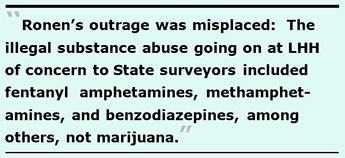 During that hearing, Supervisor Hillary Ronen expressed utter outrage that CMS was picking on LHH patients who may have been merely using marijuana, since pot is legal by prescription in California. I agree with Ronen to the extent I’ve had a medical prescription for marijuana for I can’t now remember how many years, long before it was approved statewide for recreational use. Ronen outrage was misplaced, precisely because the illegal substance abuse going on at LHH of concern to State surveyors had included fentanyl (a very strong opioid), amphetamines, methamphetamines, and benzodiazepines, among others (none of which are permitted as recreational drugs) — not marijuana.
During that hearing, Supervisor Hillary Ronen expressed utter outrage that CMS was picking on LHH patients who may have been merely using marijuana, since pot is legal by prescription in California. I agree with Ronen to the extent I’ve had a medical prescription for marijuana for I can’t now remember how many years, long before it was approved statewide for recreational use. Ronen outrage was misplaced, precisely because the illegal substance abuse going on at LHH of concern to State surveyors had included fentanyl (a very strong opioid), amphetamines, methamphetamines, and benzodiazepines, among others (none of which are permitted as recreational drugs) — not marijuana.
Unfortunately, it appears Ronen may not have been informed by Pickens, or may not have read any of the 211 pages across the eight State inspections of LHH between October 2021 and April 14, 2022, that the substance abuse involved much stronger drug abuse at LHH. The State surveyors were not concerned so much by pot infractions by LHH’s residents. The surveyors were quite concerned about the illicit drugs being used.
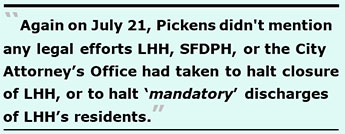 During the GAO hearing on July 21, once again, Pickens made no mention of any legal efforts LHH, SFDPH, or the City Attorney’s Office had taken, or were taking, to halt the closure of the hospital and stop the “mandatory” discharges of LHH residents to out-of-county facilities. Deputy City Attorney Anne Pearson told the GAO Committee members at the end of the GAO hearing that City Attorney David Chiu had filed three administrative appeals challenging deficiencies LHH had received on October 14, but she offered no further information about the appeals.
During the GAO hearing on July 21, once again, Pickens made no mention of any legal efforts LHH, SFDPH, or the City Attorney’s Office had taken, or were taking, to halt the closure of the hospital and stop the “mandatory” discharges of LHH residents to out-of-county facilities. Deputy City Attorney Anne Pearson told the GAO Committee members at the end of the GAO hearing that City Attorney David Chiu had filed three administrative appeals challenging deficiencies LHH had received on October 14, but she offered no further information about the appeals.
San Francisco’s Tepid Legal Efforts to Fight Back
As Dr. Kerr reported in his July 19 Westside Observer article, after CMS decertified LHH on April 14, rhetoric flared from Health Director Grant Colfax and the Health Commission vowing they would pursue “all available options.” The legal options LHH and the City Attorney’s Office pursued have been tepid, at best, and very disappointing. Colfax and the Health Commission also haven’t mentioned at all during any Health Commission meetings what, if any, legal efforts may be being pursued.
Let me acknowledge that I am obviously not a lawyer, but from reading many legal briefs filed by the City and County of San Francisco in various legal venues over the course of my 20 years as a columnist, what follows seems to potentially be sloppy lawyering trying to rescue Laguna Honda Hospital for future generations of San Franciscans.
Spoiler Alert: An observer who has followed LHH’s closure crisis and has read through Pickens’ Dispute Resolution request and City Attorney David Chiu’s three appeals, concluded it’s doubtful the four filings below are of any public interest or advocacy interest, and also concluded it was not only difficult to stay awake reading the filings but it may also be difficult to survive ploughing through reading the sophistry and hair-splitting in the CAO’s three appeals.
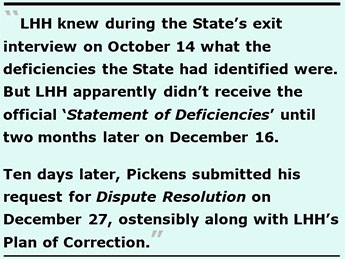 First Stab: LHH’s December 27 Informal Dispute Resolution Request
First Stab: LHH’s December 27 Informal Dispute Resolution Request
On December 27, LHH’s Acting CEO, Roland Pickens, submitted his “Request for Informal Dispute Resolution” (IDR) to the Long-Term Care division of California’s Department of Public Health (CDPH) challenging deficiencies first identified on CMS Form 2567 following the October 14, 2021 survey inspection of LHH conducted by State surveyors.
Even though Pickens and LHH knew during the State’s exit interview and Form 2567 issued on October 14 what the deficiencies the State had identified were, apparently CMS’ process is to wait for issuance of an official “Statement Deficiencies and Plan of Correction” form to a hospital or skilled nursing facility (SNF) like LHH to learn what the official deficiencies identified were. LHH apparently didn’t receive the official “Statement of Deficiencies” until two months later on December 16. Ten days later, Pickens submitted his request for Dispute Resolution on December 27, ostensibly along with LHH’s Plan of Correction for the October 14 State survey.
Pickens’ IDR request relied almost exclusively on the F-Tag #689 deficiency, titled “Free of Accident Hazards/ Supervision/ Devices.”
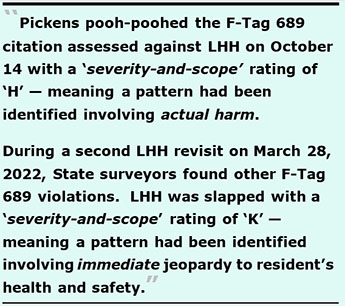 Pickens pooh-poohed the F-Tag 689 citation assessed against LHH beginning on October 14 with a “severity-and-scope” rating of “H” — meaning a pattern had been identified at LHH involving actual harm that did not rise to the level of immediate jeopardy to resident health and safety. Of note, of the eight survey inspections the State surveyors conducted at LHH between October 14, 2021 and April 13, 2022, surveyor’s cited LHH five times regarding F-Tag #689 on CMS Survey Form 2567 during subsequent on-site inspections, not just once on October 14. That suggests ongoing and continuing F-Tag #689 deficiencies after October 14.
Pickens pooh-poohed the F-Tag 689 citation assessed against LHH beginning on October 14 with a “severity-and-scope” rating of “H” — meaning a pattern had been identified at LHH involving actual harm that did not rise to the level of immediate jeopardy to resident health and safety. Of note, of the eight survey inspections the State surveyors conducted at LHH between October 14, 2021 and April 13, 2022, surveyor’s cited LHH five times regarding F-Tag #689 on CMS Survey Form 2567 during subsequent on-site inspections, not just once on October 14. That suggests ongoing and continuing F-Tag #689 deficiencies after October 14.
In fact, during a second LHH revisit for an earlier inspection survey (perhaps the October 14 initial survey) on March 28, 2022, State surveyors found other F-Tag #689 violations, including one resulting from a patient who was on oxygen found smoking in their room, but this time LHH was slapped at a “severity-and-scope” rating of “K” — meaning a pattern had been identified at LHH involving immediate jeopardy to residents health and safety that placed all residents in an unsafe living environment. So, within the six-month period between October and March 28, the severity had risen from an “H” “actual harm” to a “K” “immediate jeopardy,” since both Pickens and later City Attorney Chiu had tried to downplay that “no actual harm” had been done.
Pickens claimed the F-689 violation wasn’t applicable because the identified incidents that caused the deficiency finding had not involved “accidents” — ignoring the word “hazards” in the deficiency’s title. He went on to claim:
“… [none] of the other incidents … involved an ‘accident’ …and all of the other incidents where a patient either chose to, or because of their addictions were compelled to, use or possess drugs or alcohol or possess contraband … There [was] no … evidence presented … that any of the incidents, including the incidents where the patients were hospitalized or fell … were an avoidable accident and resulted in a pattern of deficiencies … [and hadn’t] led to actual harm to any patient.”
Pickens went on to claim:
“Because [LHH] is required to afford its patients all of the rights required under the Patient’s Bill of Rights, [LHH] cannot mandate substance use treatment, it can only offer treatment and resources to … patients who have an identified history of substance use … Patients still have the right to refuse treatment … Laguna Honda cannot ignore a patient’s privacy rights, so staff must perform [safety] searches [for contraband] within the limits of the law.”
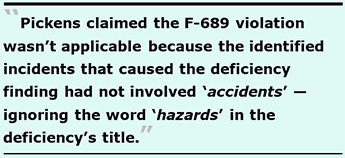 Pickens asserted the alleged incidents of actual harm found by State surveyors did not rise to the level of “avoidable accidents.” But like City Attorney Chiu who followed him, Pickens ignored the word “hazards” in the title of F-Tag 689. State surveyors view F-Tag 689 as useful in identifying, evaluating, and analyzing hazard(s) and risk(s). There are several types of accident hazards incorporated within the F-Tag 689 regulation, including patients smoking — particularly smoking near oxygen tanks and equipment — including patient supervision, resident-to-resident altercations, elopement, and patients’ vulnerability.
Pickens asserted the alleged incidents of actual harm found by State surveyors did not rise to the level of “avoidable accidents.” But like City Attorney Chiu who followed him, Pickens ignored the word “hazards” in the title of F-Tag 689. State surveyors view F-Tag 689 as useful in identifying, evaluating, and analyzing hazard(s) and risk(s). There are several types of accident hazards incorporated within the F-Tag 689 regulation, including patients smoking — particularly smoking near oxygen tanks and equipment — including patient supervision, resident-to-resident altercations, elopement, and patients’ vulnerability.
Laguna Honda’s Quality Management Department had reported to the LHH-Joint Conference Committee (LHH-JCC) of the Health Commission in LHH’s Regulatory Affairs Reports that between March and July 2022 there had been 28 Facility-Reported Incidents (FRI’s) involving resident-to-resident altercations. It’s not yet known if all 28 incidents rose to the level of F-Tag #689 violations, because those survey inspections may not yet have been completed.
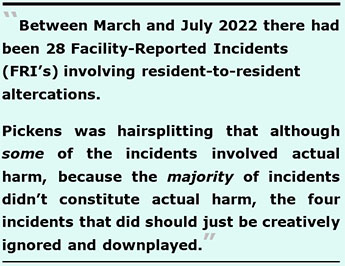 Then Pickens claimed most incidents reported by State surveyors did not constitute actual harm [but] “even if we include the four incidents that involved behavior changes had involved actual harm, the majority of the findings listed in the deficiencies did not constitute actual harm." Pickens was hairsplitting that although some of the incidents involved actual harm, because the majority of incidents didn’t constitute actual harm, the four incidents that did should just be creatively ignored and downplayed, as being essentially moot.
Then Pickens claimed most incidents reported by State surveyors did not constitute actual harm [but] “even if we include the four incidents that involved behavior changes had involved actual harm, the majority of the findings listed in the deficiencies did not constitute actual harm." Pickens was hairsplitting that although some of the incidents involved actual harm, because the majority of incidents didn’t constitute actual harm, the four incidents that did should just be creatively ignored and downplayed, as being essentially moot.
Pickens went on to assert the State surveyors had failed to establish a “pattern” that constituted “substandard quality of care.” That was complete “pap” [nonsense] because the F689 tag is by definition included in the “Quality of Care” §483.25 Federal Regulatory Group that includes 16 additional F-Tags, all of which are defined as being “substandard quality of care” by definition because of inclusion in the §483.25 Regulatory Group.
Pickens concluded saying the F-Tag #689 violation had been “misplaced,” and asked in his Informal Dispute Resolution request that the deficiency should be dismissed entirely as widespread, or be reduced to a lower rating of having been isolated incidents, not widespread ones.
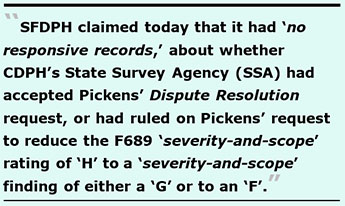 Now seven months after he filed his IDR, Pickens and SFDPH hadn’t responded to a records request filed by the Westside Observer — until today, July 29 — which had requested information on whether Pickens had prevailed on his IDR, or what other outcome of his IDR had been. SFDPH claimed today that it had “no responsive records,” about whether CDPH’s State Survey Agency (SSA) had accepted Pickens’ Dispute Resolution request, whether SSA had denied Pickens’ IDR request, whether the F-Tag 689 deficiency had been rescinded, or whether SSA had ruled on Pickens’ request to reduce the F689 “severity-and-scope” rating of “H” issued in the Statement of Deficiencies to a severity-and-scope finding of either a “G” as an isolated deficiency, or an “F ”as a widespread deficiency that caused no actual harm.
Now seven months after he filed his IDR, Pickens and SFDPH hadn’t responded to a records request filed by the Westside Observer — until today, July 29 — which had requested information on whether Pickens had prevailed on his IDR, or what other outcome of his IDR had been. SFDPH claimed today that it had “no responsive records,” about whether CDPH’s State Survey Agency (SSA) had accepted Pickens’ Dispute Resolution request, whether SSA had denied Pickens’ IDR request, whether the F-Tag 689 deficiency had been rescinded, or whether SSA had ruled on Pickens’ request to reduce the F689 “severity-and-scope” rating of “H” issued in the Statement of Deficiencies to a severity-and-scope finding of either a “G” as an isolated deficiency, or an “F ”as a widespread deficiency that caused no actual harm.
More remarkably, SFDPH claimed on July 29 that the Observer’s records request placed on July 23, 2022 to obtain LHH’s “Plan of Correction” following LHH’s October 14, 2021 State surveyor’s inspection was still being researched and wouldn’t be provided until August 4, an obvious stalling and delaying tactic.
That was clearly silly, because the March 28 CMS Form 2567 listing additional deficiencies uncovered during the March 28 re-visit survey — including the “severity-and-scope” rating of “K” — had included at the end of the survey report a “Resubmitted Plan of Correction” that cited Facility Incident number CA00744774 and four other FRI numbers — CA00745390, CA00747134, CA00746900, and CA00675386 — all of which were part and parcel of the October 14 CMS Form 2567 survey.
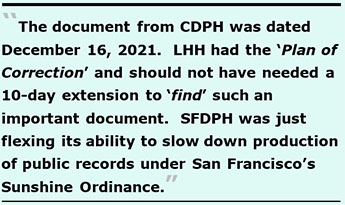 One remedy in the “Resubmitted Plan of Correction” included in the March 28 Form 2567 includes a provision that during Clinical safety searches of patients — including those “out on pass” — any contraband, paraphernalia, and/or illicit substances found will now be seized and shall be disposed of, particularly for patients who are on oxygen.
One remedy in the “Resubmitted Plan of Correction” included in the March 28 Form 2567 includes a provision that during Clinical safety searches of patients — including those “out on pass” — any contraband, paraphernalia, and/or illicit substances found will now be seized and shall be disposed of, particularly for patients who are on oxygen.
That seems to somewhat contradict with Pickens’ and later the City Attorney claimed that patient’s privacy rights and self-determination allow them to keep and use illicit substances and drug paraphernalia, and might not be seized and disposed of in the absence of “reasonable suspicion” any given patient may have such contraband in their possession.
That SFDPH had claimed it couldn’t release LHH’s initial Plan of Correction until next week was just ludicrous in the face of the Plan of Correction that was resubmitted and included in the March 28 survey report.
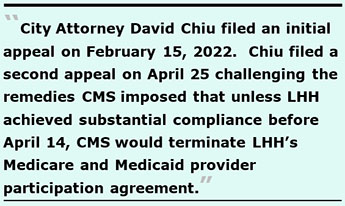 Like clockwork, SFDPH coughed up the delayed “Plan of Correction” on August 4, but the delay was totally ridiculous. The document from CDPH was dated as December 16, 2021 and date-stamped as received at LHH the next day. LHH had the document in its possession for over seven months and should not have needed a 10-day extension to “find” such an important document Pickens' filing cabinets. DPH was just flexing its ability to slow down San Francisco’s Sunshine Ordinance, putting the lie to Pickens’ claim LHH had “nothing to hide and wanted to be as transparent as possible.”
Like clockwork, SFDPH coughed up the delayed “Plan of Correction” on August 4, but the delay was totally ridiculous. The document from CDPH was dated as December 16, 2021 and date-stamped as received at LHH the next day. LHH had the document in its possession for over seven months and should not have needed a 10-day extension to “find” such an important document Pickens' filing cabinets. DPH was just flexing its ability to slow down San Francisco’s Sunshine Ordinance, putting the lie to Pickens’ claim LHH had “nothing to hide and wanted to be as transparent as possible.”
What’s taking the SSA so long to rule one way or another on Pickens’ IDR request? There’s plenty of folks who would love to know how that IDR turned out, perhaps even San Francisco’s Board of Supervisors.
[You’re welcome, of course, to read more of Pickens’ drivel in his Dispute Resolution request if you can stay awake long enough reading his filing.]
Second Through Fourth Stabds: City Attorney’s Three Appeals to U.S. DHHS Administrative Law Judge
City Attorney David Chiu filed an initial appeal to U.S. Health and Human Services secretary Xavier Becerra on February 15, 2022. The appeal was addressed to an Administrative Law Judge in DHHS’ Department Appeals Board in the Civil Remedies Division, which had to be filed within 60 days of a CMS “Enforcement Notice.” It’s unclear when LHH may have received such an enforcement notice and whether any such notice may have been filed shortly after CDPH’s October 14 inspection at LHH.
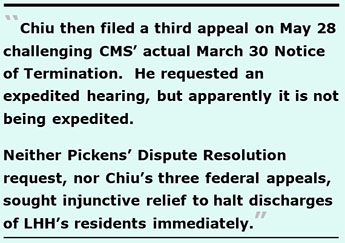 Chiu subsequently filed a second appeal on April 25 challenging the remedies CMS imposed in a letter to LHH on February 24 that unless LHH achieved substantial compliance before April 14, CMS would terminate LHH’s Medicare and Medicaid provider participation agreement. LHH had ample warning termination from CMS was being actively considered. Why was Chiu’s second appeal filed 11 days after the April 14 compliance deadline on April 25?
Chiu subsequently filed a second appeal on April 25 challenging the remedies CMS imposed in a letter to LHH on February 24 that unless LHH achieved substantial compliance before April 14, CMS would terminate LHH’s Medicare and Medicaid provider participation agreement. LHH had ample warning termination from CMS was being actively considered. Why was Chiu’s second appeal filed 11 days after the April 14 compliance deadline on April 25?
Chiu then filed a third appeal on May 28 challenging CMS’ actual March 30 Notice of Termination. He requested an expedited hearing, but apparently it is not being expedited. The second and third appeals essentially regurgitated the same legal arguments Chiu had raised in his first appeal on February 15, without adding substantial new or additional legal arguments in the subsequent appeals.
Of note, neither Pickens’ Dispute Resolution request, nor Chiu’s three federal appeals, sought injunctive relief to halt the discharges of LHH’s residents immediately during the pendency of LHH efforts seeking to become recertified to participate in CMS’ Medicare and Medicaid reimbursement program. The four efforts only sought administrative remedies.
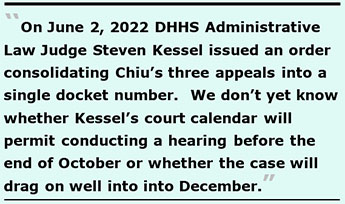 With that said, Chiu’s three appeals are aimed at overturning the decertification of LHH in the first place, which might nullify the decertification order, resume admissions to LHH, and potentially restore the 120 beds LHH was ordered to eliminate — if his appeals prevail. But in the interim, discharges and transfers out of LHH would have continued until the DHHS appeals process concludes — had Melgar’s two resolutions passed by the Board of Supervisors not brought the pause of LHH residents transfers and discharges.
With that said, Chiu’s three appeals are aimed at overturning the decertification of LHH in the first place, which might nullify the decertification order, resume admissions to LHH, and potentially restore the 120 beds LHH was ordered to eliminate — if his appeals prevail. But in the interim, discharges and transfers out of LHH would have continued until the DHHS appeals process concludes — had Melgar’s two resolutions passed by the Board of Supervisors not brought the pause of LHH residents transfers and discharges.
U.S. DHHS Administrative Law Judge
On June 2, 2022 DHHS Administrative Law Judge Steven Kessel issued an order consolidating Chiu’s three appeals into a single docket number (C-22-555). Kessel set an August 31 deadline for CMS to submit any “prehearing exchanges” (documents), and set LHH’s “prehearing exchanges” due date for October 5, 2022.
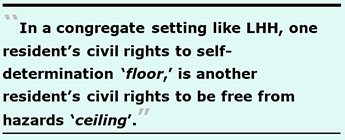 Kessel did not set an actual date for a hearing Chiu’s now consolidated appeals, so we don’t yet know whether Kessel’s court calendar will permit conducting a hearing before the end of October, or whether the case will drag on well into November or December before being resolved.
Kessel did not set an actual date for a hearing Chiu’s now consolidated appeals, so we don’t yet know whether Kessel’s court calendar will permit conducting a hearing before the end of October, or whether the case will drag on well into November or December before being resolved.
An Alternative Viewpoint
Again, although Chiu raised the issue of whether patients’ right to privacy, dignity, and self-determination, including to make choices about their life in the facility, might be violated through patient clinical safety searches to prevent drugs and contraband from entering LHH is worrisome. Dismissing that drug use and drug smuggling into LHH may protect a handful patients’ rights to privacy and self-determination, when contrasted with preventing hazards posed to all patients that could lead to unintentional harm to other patients and their rights to self-determination, could perhaps lead to LHH becoming the City’s next Tenderloin neighborhood.
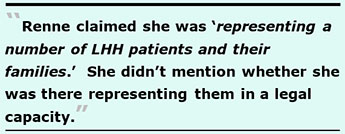 While protecting residents civil rights is clearly a San Francisco value, Chiu forgets that in a congregate setting like LHH, one resident’s civil rights to self-determination “floor,” is another resident’s civil rights to be free from hazards “ceiling.”
While protecting residents civil rights is clearly a San Francisco value, Chiu forgets that in a congregate setting like LHH, one resident’s civil rights to self-determination “floor,” is another resident’s civil rights to be free from hazards “ceiling.”
Why Did City Supervisors Drag in Louise Renne?
During the July 21 Board of Supervisors Government Audit and Oversight hearing on LHH’s closure, Supervisors dragged in somewhat-disgraced former-City Attorney Louise Renne. Why? I’m still scratching my head trying to figure that out.
First, at the start of the July 21 GAO hearing, Renne claimed she was there “representing a number of LHH patients and their families” (at about 3:26:44 on videotape). She didn’t mention whether she was representing them in a legal capacity, or just as a concerned supporter of LHH’s residents. August 4 Update: Renne has now filed a lawsuit representing four LHH residents.
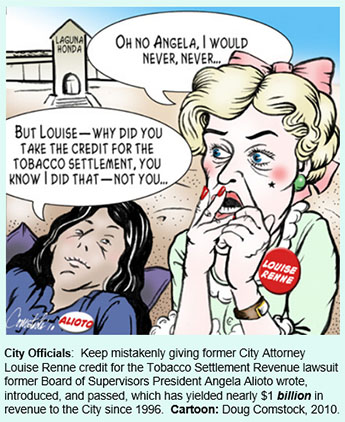 Shortly after, she volunteered she had read all of the violations reported in the 211 pages of CDH’s Form 2567 inspection reports. I find that hard to believe.
Shortly after, she volunteered she had read all of the violations reported in the 211 pages of CDH’s Form 2567 inspection reports. I find that hard to believe.
Second, upon questioning by the Board of Supervisors near the end of the hearing, she was asked if she had filed any lawsuits about the patient discharges. She replied that she had not.
Let’s consider some of Renne’s past history.
During the June 2010 grand opening ribbon-cutting ceremony for the LHH rebuild replacement hospital, speaker after speaker — including then-District 7 Supervisor Sean Elsbernd, then-State Senators Leland Yee and Mark Leno, the eventually disgraced then-Director of Public-Health Mitch Katz, and then-Mayor Gavin Newsom — all repeatedly praised Renne for having thought of and won the Tobacco Settlement Revenue lawsuit that was used, in part, to pay for the LHH rebuild project. Renne had done no such thing.
It was Angela Alioto who had come up with a novel legal cause of action: San Francisco should not sue as a consumer for product liability; it should instead sue as the employer of a consumer because as an employer, the City had been obliged to pay for healthcare to treat smoking related illnesses suffered by its City employees who may have been harmed by smoking tobacco.
Indeed, just five minutes before the then-San Francisco Board of Supervisors were scheduled to take a vote in 1996 to approve suing the tobacco companies, Renee had waltzed into then-Board President Angela Alioto’s office trying to stop the Board from approving the lawsuit, in part to appease then Mayor Willie Brown — who was notorious for stuffing campaign contributions from tobacco lobbyists into his war chest. Renne claimed the City didn’t have $1 million to pay for the lawsuit, which was complete nonsense.
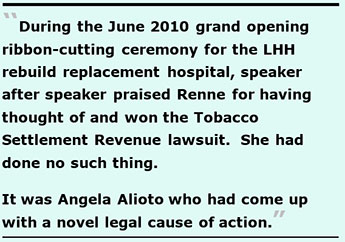 San Francisco’s Fiscal Year 2008–2009 City Budget stood at approximately $6.5 billion. Basic math and common sense tells you — unless you’re smoking some affecting your brain, say cigarettes — that there are 6,500 separate $1 million pools of cash in $6.5 billion. And a mere one $1 million chunk of money couldn’t be found in 6,500 one-million chunks? Alternatively, the Department of Public Health’s budget that Fiscal Year was $.158 billion, which had 1,580 one-million such chunks. Who was Renne trying to fool with her outlandish claim the City didn’t have $1 million?
San Francisco’s Fiscal Year 2008–2009 City Budget stood at approximately $6.5 billion. Basic math and common sense tells you — unless you’re smoking some affecting your brain, say cigarettes — that there are 6,500 separate $1 million pools of cash in $6.5 billion. And a mere one $1 million chunk of money couldn’t be found in 6,500 one-million chunks? Alternatively, the Department of Public Health’s budget that Fiscal Year was $.158 billion, which had 1,580 one-million such chunks. Who was Renne trying to fool with her outlandish claim the City didn’t have $1 million?
Renne also ignored the massive return on investment: Spending a paltry $1 million for a lawsuit that could rake in $1 billion in tobacco settlement revenue for the City over the 60-year life of Alioto’s planned lawsuit — assuming she prevailed — was also a common-sense math problem most ten-year-old’s would have understood as a great return on investment. What was Renne thinking?
Renne’s gambit didn’t work because Alioto had a veto-proof support from eight Supervisors to prevent a mayoral veto by Willie Brown. The Supervisors wound up passing Alioto’s resolution unanimously, directing Renne to use a very specific lawsuit strategy to file the lawsuit. Due to her novel legal strategy, Alioto has brought in (or is on track to bring in) one billion and two million dollars in revenue to the City by June 30, 2060!
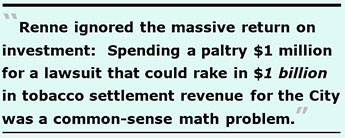 It’s thought Alioto’s successful lawsuit that brought in the $1 billion in revenue to the City is the largest settlement award in City history. Hopefully at the end of the first 60-year term, a Court of competent jurisdiction might extend the life of the lawsuit, and perhaps bring in an additional $1 billion in revenue to the City’s coffers.
It’s thought Alioto’s successful lawsuit that brought in the $1 billion in revenue to the City is the largest settlement award in City history. Hopefully at the end of the first 60-year term, a Court of competent jurisdiction might extend the life of the lawsuit, and perhaps bring in an additional $1 billion in revenue to the City’s coffers.
Shamefully, Renne and Mayor Brown eventually outsourced filing the lawsuit to a private law firm in order to spare Brown the embarrassment of City Attorney employees suing Brown’s own campaign donors.
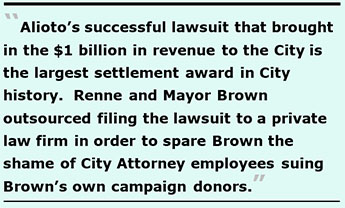 All of this is something I wrote about as the “San Francisco Hospital Examiner” for an early (and primitive) San Francisco Examiner website called “www.examiner.com.” My article, and an accompanying slideshow about Ms. Alioto’s 1997 memoir, “Straight to the Heart — Political Cantos,” are still available on my own website.
All of this is something I wrote about as the “San Francisco Hospital Examiner” for an early (and primitive) San Francisco Examiner website called “www.examiner.com.” My article, and an accompanying slideshow about Ms. Alioto’s 1997 memoir, “Straight to the Heart — Political Cantos,” are still available on my own website.
Renne’s Other Embarrassing Scandals
In addition to the tobacco lawsuit embarrassment, Renne’s non-profit "Laguna Honda Foundation" ran into other embarrassments.
While Renne had ostensibly created her foundation specifically to raise $15 million in charitable donations to purchase new furniture, fixtures, and equipment (FFE) for the LHH replacement facility that opened in June 2010, in the end Renne raised not one penny towards the FFE purchase.
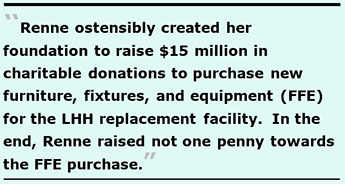 In addition, Renne’s foundation ran into various troubles with San Francisco’s Health Commission, as I wrote for the Westside Observer in December 2012. Renne formed her foundation in 2004 — without a written memorandum of understanding (MOU) with either the City, Laguna Honda Hospital, or the Health Commission. She obtained IRS designation as an independent non-profit charitable foundation.
In addition, Renne’s foundation ran into various troubles with San Francisco’s Health Commission, as I wrote for the Westside Observer in December 2012. Renne formed her foundation in 2004 — without a written memorandum of understanding (MOU) with either the City, Laguna Honda Hospital, or the Health Commission. She obtained IRS designation as an independent non-profit charitable foundation.
But oddly, Renne also claimed her foundation was simultaneously a client of “Community Initiatives,” a different non-profit charitable foundation who was acting as Renne’s “fiscal sponsor.” You can’t be both an independent IRS charitable non-profit foundation and at the same time use a “fiscal sponsor” to report your Form 990 to the IRS.
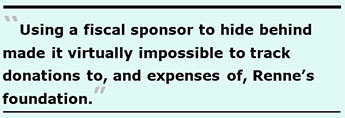 Using a fiscal sponsor to hide behind made it virtually impossible to track donations to, and expenses of, Renne’s foundation. That’s one reason Fiscal Sponsors are used, in the first place.
Using a fiscal sponsor to hide behind made it virtually impossible to track donations to, and expenses of, Renne’s foundation. That’s one reason Fiscal Sponsors are used, in the first place.
Eventually Community Initiatives dropped Renne’s foundation as a “sponsored project,” reportedly unexpectedly on January 14, 2013. Renne’s foundation was no longer a sponsored project of Community Initiatives, per its CEO, Melanie Beene.
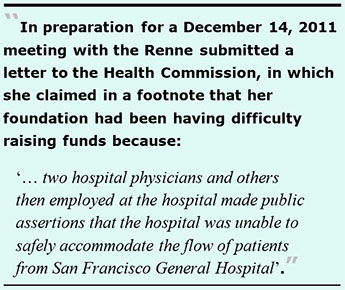 The Health Commission had long been worried about the lack of reporting concerning the Renne foundation’s finances, because her foundation had failed to disclose either its income and expenses, or the three categories of spending the IRS requires non-profits report on Form 990’s: Fundraising, Management and General, and Program Services spent on actual services. The three categories are used to evaluate the financial accountability of non-profits. The Foundation’s Form 990 submitted in 2011 to the IRS reported zero income and expenses as a Community Initiatives fiscal sponsored client.
The Health Commission had long been worried about the lack of reporting concerning the Renne foundation’s finances, because her foundation had failed to disclose either its income and expenses, or the three categories of spending the IRS requires non-profits report on Form 990’s: Fundraising, Management and General, and Program Services spent on actual services. The three categories are used to evaluate the financial accountability of non-profits. The Foundation’s Form 990 submitted in 2011 to the IRS reported zero income and expenses as a Community Initiatives fiscal sponsored client.
The Health Commission had tried repeatedly across the years to obtain the Laguna Honda Foundation’s financial data, but they had repeatedly been rebuffed by Renne, who stridently refused to cooperate with the Health Commission.
In preparation for a December 14, 2011 meeting with then-Health Commission president Steven Tierney and its then-vice president, Sonia Melara, Renne submitted a letter to the Health Commission dated December 8, 2011, in which she claimed in a footnote that her foundation had been having difficulty raising funds because:
“… two hospital physicians and others then employed at the hospital made public assertions that the hospital was unable to safely accommodate the flow of patients from San Francisco General Hospital. They placed an initiative on the [June 2006] ballot, Proposition D, which sought to limit the hosptal’s safety net mission.”
There’s that pesky “flow project” from SFGH problem again that has caused so many of the problems at LHH over the past 18 years since 2004.
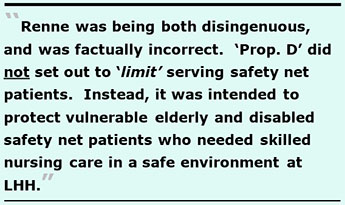 Renne was being both disingenuous, and was factually incorrect: I was there and participated in supporting “Prop. D.” “Prop. D” did not set out to “limit” serving safety net patients. Instead, it was intended to protect vulnerable elderly and disabled safety net patients who needed skilled nursing care in a safe environment at LHH, given the dangerous mix of aggressive, younger, able-bodied, behavioral health and substance-abusing patients from SFGH being stuffed into LHH where they, too, also would not receive the appropriate level of care and safety that they needed.
Renne was being both disingenuous, and was factually incorrect: I was there and participated in supporting “Prop. D.” “Prop. D” did not set out to “limit” serving safety net patients. Instead, it was intended to protect vulnerable elderly and disabled safety net patients who needed skilled nursing care in a safe environment at LHH, given the dangerous mix of aggressive, younger, able-bodied, behavioral health and substance-abusing patients from SFGH being stuffed into LHH where they, too, also would not receive the appropriate level of care and safety that they needed.
By two physicians, Renne was undoubtedly referring to the LHH physicians, Director of Medical Services, Dr. Maria Rivero who was on LHH’s Patient Screening Committee, and Dr. Kerr. By “and others,” Renne was referring to me and others who had been writing articles for the precursor publication of the Westside Observer about the downsizing of LHH’s 1,200 patient beds to just 760 beds due to the massive cost overruns of the replacement hospital.
The Commission summoned Renne again to a Health Commission meeting on March 6, 2012; she dragged along Derek Parker, Vice President of the Board of Directors of Renne’s foundation, to accompany her to the hearing. Parker had somewhat of a conflict of interest, in that Parker had served in various roles at Anshen + Allen, the architects who designed Laguna Honda’s new facilities, including as a principal, as its former CEO, as a member of its Board of Directors, and as its Director Emeritus.
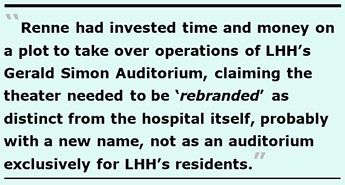 Renne and Parker were unable to answer a number of pointed questions about their plans to outsource operations of LHH’s Gerald Simon Theater, why LHH’s patient gift shop had still not reopened two years after the hospital’s grand opening in June 2010, and basic questions about finances of Renne’s foundation.
Renne and Parker were unable to answer a number of pointed questions about their plans to outsource operations of LHH’s Gerald Simon Theater, why LHH’s patient gift shop had still not reopened two years after the hospital’s grand opening in June 2010, and basic questions about finances of Renne’s foundation.
In addition to the problem of not re-opening a gift shop, my December 2012 article also reported Renne had invested time and money on a plot to take over operations of LHH’s Gerald Simon Auditorium. We learned that Renne’s foundation had commissioned a draft report in July 2011 from AECOM, titled “Demand Assessment for Gerald Simon Theater.”
The assessment claimed Gerald Simon auditorium needed to be “rebranded” as distinct from the hospital itself, probably with a new name to convey it as a community theater, not as an auditorium exclusively for LHH’s residents. The report indicated that in order to generate about $156,000 in annual revenue, a community theater at Laguna Honda would have to hold approximately 12 events each month, and noted resident use of the auditorium would probably be of concern when scheduling rental events.
Luckily Renne was unable to complete her coup to take over LHH residents’ auditorium.
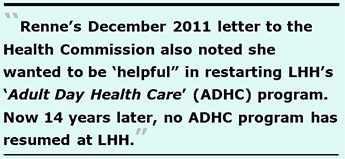 Renne’s December 2011 letter to the Health Commission also noted she wanted to be “helpful” in restarting LHH’s “Adult Day Health Care” (ADHC) program, which had been run by staff in the hospital’s Activity Therapy Department. Space had not been included in the replacement hospital buildings for an ADHC, and ended operations of the ADHC in LHH’s old buildings in 2008 or 2009 in anticipation of the grand opening of the new facilities.
Renne’s December 2011 letter to the Health Commission also noted she wanted to be “helpful” in restarting LHH’s “Adult Day Health Care” (ADHC) program, which had been run by staff in the hospital’s Activity Therapy Department. Space had not been included in the replacement hospital buildings for an ADHC, and ended operations of the ADHC in LHH’s old buildings in 2008 or 2009 in anticipation of the grand opening of the new facilities.
The ADHC program had bused in elderly and disabled San Franciscans, or people with Alzheimer’s and other dementia’s living in the community who couldn’t be left unattended, and needed cognitive stimulation and safe-caring to give medical respite to their families during the day. Now 14 years later, no ADHC program has resumed at LHH, although there are plans to add an ADHC to the senior housing proposed for adding on to LHH’s campus.
Renne claimed during the Health Commission meeting that her foundation had made numerous “gifts” to LHH, but the Commission noted it had been unable to find any documentation of those gifts, which had to have been approved by the Health Commission and by the Board of Supervisors during agendized public meetings of both oversight bodies.
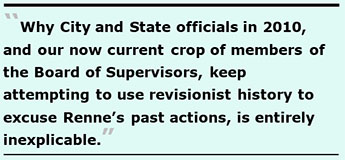 Following an apparent investigation by the Registry of Charitable Trusts, a division of California’s Attorney General, the Registry forced Renne to dissolve her foundation; she notified the Registry on January 15, 2013 her foundation ceased operations on January 15, 2013 and claimed there were no remaining assets in her foundation.
Following an apparent investigation by the Registry of Charitable Trusts, a division of California’s Attorney General, the Registry forced Renne to dissolve her foundation; she notified the Registry on January 15, 2013 her foundation ceased operations on January 15, 2013 and claimed there were no remaining assets in her foundation.
Why City and State officials in 2010, and our now current crop of members of the Board of Supervisors, keep attempting to use revisionist history to excuse Renne’s past actions, is entirely inexplicable. So disgraceful has her involvement been across the years, she should not be trotted out and thanked for her service to LHH, or for winning the tobacco settlement lawsuit, which was, and remains, a complete myth.
Postcript, August 4
On August 4 news broke two lawsuits have finally been filed. News also broke the same day that the number of patients who died following their discharge or transfer out LHH has risen to nine, 15.8% of the discharges made before Thursday , July 28 when all discharges were temporarily paused.
Why did it take 14 weeks between the termination of LHH from CMS’ reimbursement program on April 14 and August 3, to finally see the City Attorney file an actual lawsuit, and not just administrative appeals?
Both lawsuits were filed yesterday, August 3, in the U.S. District Court for the Northern District of CA.
One lawsuit was filed by David Chiu seeking injunctive relief for 1) Relief from the September 13 deadline cutting off CMS reimbursement to LHH, and 2) Relief extending CMS funding until Chiu’s three administrative appeals (now consolidated into a single docket number) is concluded and all LHH residents are transferred or discharged.
The second lawsuit — which starts on page 28 in the PDF file attached — was filed by Louise Renne and her “Public Law Group.”
Renne’s firm filed on behalf on one conserved LHH resident, and three other public guardians: John Doe 1, a 49 y.o. with a TBI; Jane Doe 1, an 86 y.o. with late-stage dementia; Jane Doe 2, a 45 y.o with brittle diabetes; and John Doe 2, a 58 y.o with a hemorrhagic strike.
Renne’s lawsuit seeks injunctive, declaratory, and class-wide relief, and requested a Trial Jury.
Renne’s 10 “Claims for Relief” include Title II ADA violations, 1973 Rehabilitation Act violations, seeks a Writ of Mandate against Aragon, multiple due process violations, Administrative Procedures Act violations, and two violations against Aragon for California Constitution violations.
Monette-Shaw is a columnist for San Francisco’s Westside Observer newspaper, and a retired City employee. He received a James Madison Freedom of Information Award in the “Advocacy” category from the Society of Professional Journalists–Northern California Chapter in 2012. He’s a member of the California First Amendment Coalition (FAC) and the ACLU. Contact him at monette-shaw@westsideobserver.com.